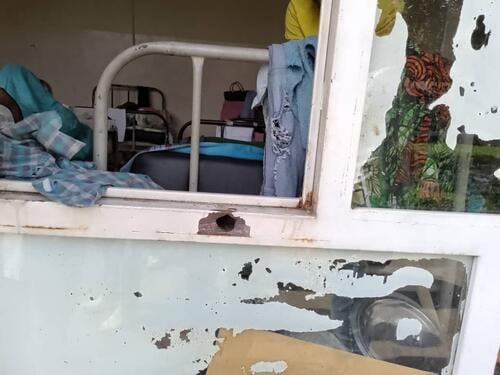GOMA - Médecins Sans Frontières (MSF) condemns the shooting that left one person dead in the Kyeshero hospital
Faced with a resurgence of violent incidents affecting healthcare services in the ongoing conflict in the provinces of North and South Kivu in the Democratic Republic of Congo (DRC), Médecins Sans Frontières (MSF) once again condemns in the strongest possible terms the use of weapons in and around healthcare facilities. The latest example led to the death of a person in a hospital in Goma where MSF teams work.
On the night of Friday 4 to Saturday 5 April 2025, around 20 armed men belonging to the M23/AFC entered the grounds of the Kyeshero hospital in Goma in search of people who had taken refuge inside the hospital and stayed for several weeks. During this operation, the MSF teams supporting the Intensive Nutritional Treatment Unit (UNTI) of this private structure linked to the Ministry of Health witnessed these armed men shooting outside the hospital wards. One person was killed and three others were wounded. Two members of hospital staff were severely beaten. Although the gunmen did not enter the wards, bullets landed inside some of them.
“The use of force and weapons inside the Kyeshero hospital has transformed a medical facility, which was supposed to remain a safe place at all times, into a dangerous zone where one person was killed. The shooting spread fear and disrupted medical services. A bullet passed through a window and landed in a patient's mattress. Such events are unacceptable and must never be repeated, either in Goma or elsewhere,” explains Margot Grelet, MSF emergency coordinator in Goma and North Kivu.
The use of force and weapons inside the Kyeshero hospital has transformed a medical facility, which was supposed to remain a safe place at all times, into a dangerous zone where one person was killed.Margot Grelet, MSF emergency coordinator in Goma and North Kivu.
This violent incident is not an isolated event but reflects an alarming increase in violence perpetrated by all parties to the ongoing conflict, affecting health facilities and workers and endangering the lives of patients and medical staff in the east of the Democratic Republic of Congo since the beginning of 2025.
Since the beginning of the year, MSF teams have had to deal with around 15 violent incidents directly affecting the structures and hospitals they support in the two provinces. One of the latest tragic examples took place on 20 February, in Masisi Centre in North Kivu, when in clashes between VDP/Wazalendos and M23/AFC fighters shot and wounded two people in the MSF base, including MSF employee Jerry Muhindo Kavali, who died of his injuries two days later. In Walikale, 150 kilometres from Masisi, a crossfire hit our base on 19 March, impacting our structures and some of our vehicles during clashes between FARDC and M23/AFC, and their respective allies.
In South Kivu, the General Referral Hospital in Uvira came under fire in mid-February during clashes in the town, seriously endangering patients and staff. Medical activities had to be interrupted, and patients had to take cover to avoid being hit. Armed men had also entered the hospital premises, moving around and shooting inside.
Without minimum security guarantees, health workers and humanitarian organisations cannot work. They must not risk their lives to continue providing vital care to the population. We call on all parties concerned to preserve the civilian character of health facilitiesMargot Grelet, MSF emergency coordinator in Goma and North Kivu.
MSF reiterates its commitment to providing medical care alongside local health services in the conflict-affected provinces of eastern DRC. However, the increased frequency and severity of these incidents is straining our capacity to respond and may lead to the suspension of some services. “Without minimum security guarantees, health workers and humanitarian organisations cannot work. They must not risk their lives to continue providing vital care to the population. We call on all parties concerned to preserve the civilian character of health facilities,” adds Margot Grelet.
In Goma, as in several localities in North and South Kivu, MSF supports several health structures, particularly in the provision of primary and secondary healthcare, maternal, paediatric, cholera and malnutrition care and care for victims of sexual violence. MSF has been working in the Kyeshero hospital in Goma for several years, particularly in the management of cases of malnutrition. MSF teams have also supported the Kyeshero and Virunga hospitals in Goma, as well as the Minova General Referral Hospital and the Numbi hospital centre in South Kivu, in treating people wounded in armed clashes at the start of the year.



